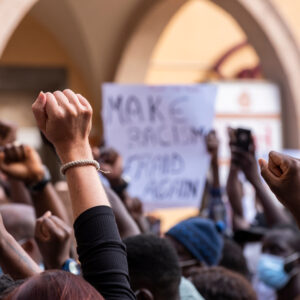Our commitment to dismantling racism and supporting justice for Black people
During the Red Summer of 1919, a series of white-led, racist riots violently targeted Black people and communities across the United States. Waves of white-supremacist terrorism ripped through more than thirty cities throughout the US, including Chicago; Washington, DC; and Elaine, Arkansas; where hundreds of Black people were murdered that year.
More than a hundred years later, sadly, not much has changed. In May 2020, many white people were shocked as they witnessed Minneapolis police officer Derek Chauvin press his knee onto the neck of George Floyd as he begged for his life. Floyd’s murder sparked worldwide protests—and rightfully so. However, Los Angeles law enforcement has killed hundreds of people—mostly Black and brown people—in the last eight years, with little recognition, outrage, or accountability. Los Angeles is one of many cities experiencing this throughout the year, outside of the media cycle.
In recent years, Corporate Accountability has recognized its white-centered, white-led origins, and has begun the work of unraveling and dismantling organizational racism. But it is time for us to move further and faster.
For more than forty years, our organization has focused our efforts on the role of transnational corporations advancing injustice, trampling human rights, and devastating our environment. And we know, from decades of campaigning, how corporations, government, and agents of oppression have continually profited from, tested on, consumed, exploited, harmed, disenfranchised, and forgotten Black people, Black communities, and Blackness.
As we have witnessed in every decade since America’s inception, Black people have been fighting for dignity, rights, a seat at the table, and their own table while facing down violence, aggression, and power along the way.
We have decided to focus on three critical areas where we think that our organizing model, resources, partners, and staff could best support Black communities:
- Education. As a public good, education—both the withholding and access
to it—has created seismic shifts in Black communities. Throughout U.S. history, literal blood has been shed over equal access to educational resources. Now, with Black communities being used as a bargaining chip, the corporate-backed privatization of school systems has ramped up in the mad dash to profit off one of our most essential public goods, which has been systematically denied to Black communities for decades. Add to this the role of the school to prison pipeline across the country which adversely impacts Black, brown, Indigenous, and cash-poor communities. - Police violence. As one of the most overt and publicly accessible manifestations of racism and white supremacy, police violence remains at the forefront. While many have focused on police reform, we envision following the lead of Black leaders that center abolition and strategic divestment campaigns.
- Reparations. We are no experts in the call for reparations for the descendants of slavery, but we are here to follow the Black leadership of those fighting for justice. Reparations theory is a foundation of our work. We hold corporations liable for their harms, such as “Make Them Pay” organizing on our tobacco and climate campaigns. We know that holding corporations responsible for the death and disease of tobacco use, and for the destruction of our planet would not have been a feasible process without the historic work of those who have continued the call for reparations.
We follow the path of the greats who came before us, including intersectional Black leadership that has helped shape our movement ecology. To quote from the Black feminist Combahee River Collective statement developed right here in Boston, the site of our headquarters: “If Black women were free, it would mean that everyone else would have to be free since our freedom would necessitate the destruction of all the systems of oppression.”
We believe that we can, in fact, follow and support the liberatory politics of Black leadership today that can help dismantle all systems of oppression tomorrow. We are committed to doing the work of true partnership: unlearning, learning, doing, collaborating, and reflecting on all that this commitment requires of us.
The participating Black staff of Corporate Accountability developed this statement, shared and welcomed by Corporate Accountability leadership broadly, and further disseminated to all staff, Board, and now our members.







